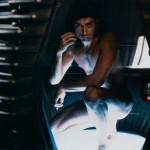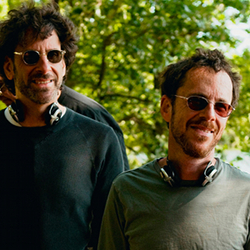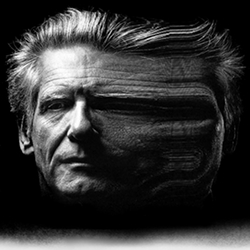
TIFF’s From Within - The Films of David Cronenberg Review: Spider (2002) - NP Approved
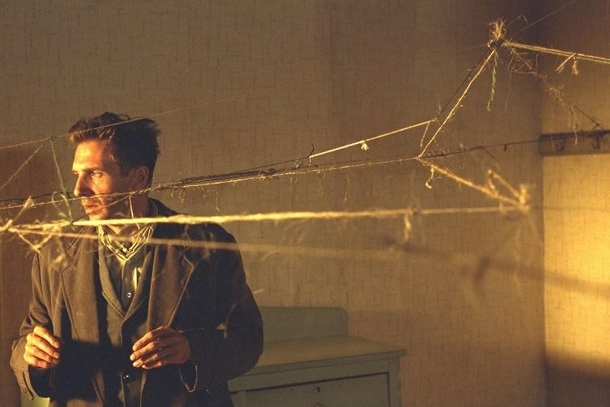
Cast: Ralph Fiennes, Miranda Richardson, Gabriel Byrne
Director: David Cronenberg
Country: Canada | UK
Genre: Drama
Editor’s Notes: The following review is part of our coverage for TIFF’s From Within: The Films of David Cronenberg which runs from November 1st to January 19th at TIFF Bell Lightbox. For more information on upcoming TIFF film series visit http://tiff.net and follow TIFF on Twitter at @TIFF_NET.
Memory can be subjective, self-serving, and unreliable even in the most stable minds, but when left in the tenuous grasp of a psychologically impaired mind, memory can be particularly untrustworthy. David Cronenberg’s Spider shows us the world through the wounded mind of Dennis Cleg (Spider) as he desperately attempts to piece together the unfortunate events that have shaped his life and placed him within the steam-damaged walls of a halfway house after being held in an insane asylum for an indeterminate amount of time. Spider is an alien in the world as he attempts to negotiate the labyrinthine memories that plague his thoughts in the hopes of reconciling traumatic events that live in dubiously static clarity in his broken mind. Spider frantically takes indecipherable notes as memories come flooding back as he explores the alleyways and drab townhouses that defined his youth. Those unreliable memories intermingle with reality to create untrustworthy sights and sounds that paint a fractured and ambiguous narrative from inside Spider’s broken mind. Are the faces of the past haunting his present or is his present redefining his interpretation of past events? Cronenberg leaves a veil of uncertainty that obfuscates the objectivity of Spider Cleg’s reality, and with Spider we are given the vantage of an emotionally and psychologically stunted man and are tasked with deciphering the meaning of an ugly world of cracked walls and mysterious foul smells through his flawed and tenuous grasp on reality.
David Cronenberg’s Spider shows us the world through the wounded mind of Dennis Cleg (Spider) as he desperately attempts to piece together the unfortunate events that have shaped his life…
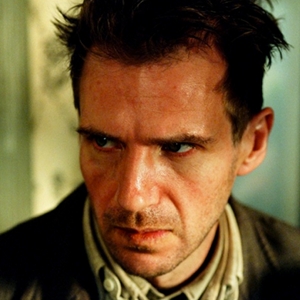
A train pulls into a London station and a flood of people awkwardly pass by the camera with uncomfortable disregard for our innate sense of personal space. These appear to be modern people carrying out typical hurried contemporary existences, save for the last man who leaves the train and attempts to negotiate the concrete platform like someone discovering that they have legs for the first time. He moves at a pace out of tune with the harmonic vibrations of the world, constantly adjusting his means of perception to try and contend with an onslaught of unfamiliar sights and sounds. His only guidance is an address scribbled on a scrap of paper and a suitcase presumably containing all of his worldly possessions as he sets about on his journey to the unfamiliar address. It is clear that he hasn’t traversed these spaces in years as the world seems new and unfamiliar and a construction project corrupts the skyline with imposing monolithic malfeasance, but some spaces seem intimately familiar and come alive with memories and figures from the past when he peers into alley windows and watches his childhood replay before his eyes.
Cronenberg’s calculated ambiguity makes it difficult to determine the objectivity the events in either timeline, giving us the same tenuous grasp on reality as Spider with his deep psychological disturbances and self-serving reinvention of past events.
The objectivity of these memories is immediately questionable as we are presented with scenarios and vantages that Spider would have not have been present for and faces that bleed into both timelines against his will. Spider’s mother is the unnatural darling of his affection at a young age and provides the only connection to reality for the marred soul of the confused young boy. Spider lingers inappropriately as he watches his mother model lingerie in the mirror and becomes stricken with severe Oedipal rage when she mentions his father, a man who we only know as a philandering alcoholic who may have engaged in an extramarital affair with one of the crass whores that make up the colorful backdrop of the local pub that his father frequents. These women could come from genuine childhood memories from Spider’s fractured mind, but a dockside sexual rendezvous between Spider’s father and one of the prostitutes melts into cryptic ambiguity as the fully grown Spider replaces his father at the climax of this encounter. It is uncertain what traumatic events actually transpired to skew the vulnerable boy’s perception of reality, but something has damaged his esteem for his mother and dislodged the inappropriate intimacy of their unusual relationship. Through the warped perception of Spider’s naiveté and tenuous grasp on reality it is difficult to determine if these problems were the result of his mother forgiving his father after Spider’s memories of transgressions against her or if he has truly seen something that has permanently wounded his impressionable psyche.
These convenient misinterpretations of memories are helpful for Spider to exonerate himself for any potential misdeeds, but do not explain his lengthy incarceration in a mental asylum and the faces that invade both timelines as he gives the same grotesque whore’s face to women that have angered him in both contexts. Cronenberg’s calculated ambiguity makes it difficult to determine the objectivity the events in either timeline, giving us the same tenuous grasp on reality as Spider with his deep psychological disturbances and self-serving reinvention of past events. The veil is somewhat lifted at the end of the film as Spider confronts his own tragic misdeeds, but an air of uncertainty remains as the unreliable narration that results from his fractured perception of the world leaves us to question the validity of each image that preceded in one of Cronenberg’s most intriguing and enigmatic films.
Related Posts
![]()
Matthew Blevins
![]()
Latest posts by Matthew Blevins (see all)





